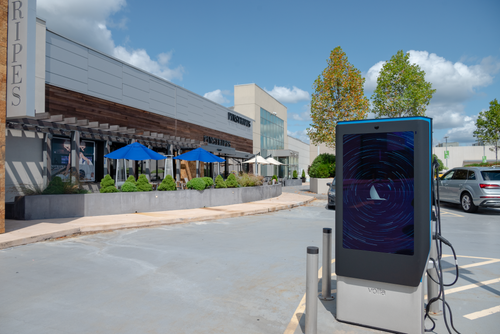Bringing the future to Main Street
As more Electric Vehicles (EVs) make their way down American roadways a new opportunity for main street businesses emerges.
One of the biggest drawbacks of an EV compared to a gas-powered car is not only that charging facilities are harder to find than gas stations, but they also take significantly longer to use. Even with a level 3 charger, the quickest available technology, fully charging the battery of many EVs can take from 30 minutes to an hour.
But savvy cities can leverage this technological shortcoming to boost businesses on their main streets, and a recent webinar hosted by the Connecticut Main Street Center sought to highlight Charge Deals, an app that promotes businesses near public EV charging infrastructure and incentivizes stops with discounts and deals.
“We all know a great downtown when we’re in it,” said Savanah Blantz, the Programs Coordinator for the Main Street Center. “It’s a feeling, an energy that we can sense, see and experience. But it can be quite hard to articulate what makes a main street great.”

Blantz laid out vital qualities which the Center considers key for crafting a vibrant downtown area:
“The Main Street is connected by multiple modes of transportation for people to access, It’s welcoming, friendly, and inclusive. It has sustainable practices in place that bring life and vibrancy, and small businesses are supported and encouraged as well as residential and commercial development,” she said, adding that these all add up to a unique sense of space and identity that can make the street an attraction in its own right.
A pilot run of a new app, available to towns across Connecticut for a $500 fee seeks to make it easier for those vibrant downtowns to be discovered by travelers.
Biran Coon, the founder and CEO of Charge Deals noted that while there was some slow down in sales of EVs, their numbers continue to grow and that EV owners already represent a valuable demographic for many businesses.
“I’ve been an electric vehicle driver for the past several years,” Coon said, noting that in his home state of Michigan chargers can be harder to find, increasing “range anxiety” when venturing far from their at-home charging station.
“The time that you need to utilize public charging is on longer trips, and right now the range is around 300 miles, so at 250 miles EV drivers are looking for a place to charge. And when they do have to charge, they’re not there for three to five minutes like a gas station. That stop can last from 20 minutes to up to a few hours.”
“This really is a huge opportunity for downtowns because, one, you are attracting people from outside the community’s electric car drivers from places 250 miles or more to your downtown area, and they’re a captive audience when they’re there,” Coon said.
“They probably don’t want to sit in their car and go on Facebook for 35 minutes. Hopefully we can get them out of their vehicle and spending money in your downtown area,” he added.
“That’s exactly what Charge Deals is doing. Our focus is not only attracting these drivers to use EV chargers, but once they do plug in to get them out of their vehicle and spend money locally.”
Coons explained drew on his experience working for a utility company to explain that many EV chargers serving the public, even those that charge fees for usage, are currently losing money and the break-even point might be far in the future. And unlike gas stations, where drivers will develop a preference for one near their home, EV drivers likely prefer charging at home to using chargers in the 30 to 40 mile range from home.
“Many towns are offering it for free because the greater benefit really comes from those drivers spending money while they’re plugged in,” Coons said of the towns and cities where he has charged up in his own travels.
Coons noted that the types of businesses which tend to benefit the most from Charge Deals are coffee shops, restaurants with shorter mealtimes, and boutique stores with interesting or unique offerings. These are both the best suited to providing small discounts to travelers who use the app to navigate, and the best match for the length of time they’re likely to spend at the charger.
He said an insurance broker or bank are examples of businesses that are less able to take advantage of out-of-town traffic in prior pilot studies.
During the pilot, interested towns can sign up for a one-time fee of $500, which allows them to invite an unlimited number of local businesses to the app to offer incentives to EV drivers using any public charger near their location. Businesses that wish to list chargers near them in towns that are not participating can become listed for $1.99 per month after launch.
To learn more about Charge Deals or discuss how to encourage your municipality to participate, visit https://chargedeals.com/downtown/